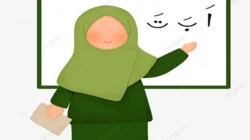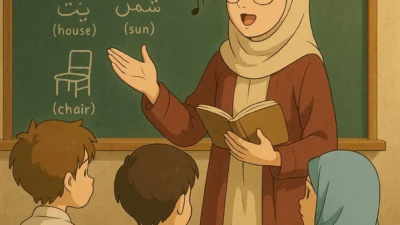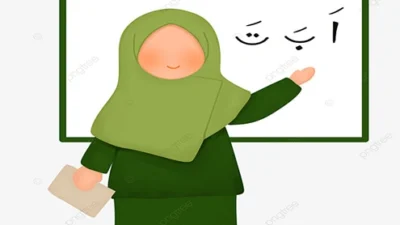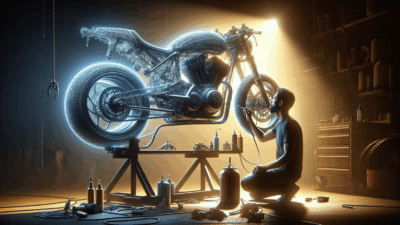Three-hour drive from Odessa to Moldova, his mother said “It’s hard to send you go but to know that you will be in a safer place, I have no other choice.”
September 20, 2024. Warplanes. No aircraft. Ukrainian exchange students had to choose which neighboring countries they would depart from. Maksym Plaksa, a fourth-year History student at Kyiv University, chose to depart from Moldova, a three-hour drive from his hometown, Odessa, with his mother and his sister sent him to go. While another student from the capital of Ukraine, Kyiv, Illia Rachok, a second-year International Relations student, chose to depart from Warsaw, a nine-hour drive with a bus crossing the borders. Both look forward to the life ahead of them, thinking Indonesia would be very tropical with beaches here and there. Looking back, “It was silly because now that I’m here we only got kali (river) and pollution,” said Illia, giggling embarrassingly.
Amidst the War
February 24, 2022, in the capital of Ukraine, Kyiv, the sound of warplanes ruined the peaceful winter morning, it was a rather chilly morning, perfect to continue a slumber. Instead, Illia woke up to the sound of bombs dropped that were depressing to bear. Russia’s full-scale invasion of Ukraine, the largest European war since World War 2 has just exploded. “What is going on?” “How are we going to go through our life?” popped out of his head. He looked through his apartment’s windows. Military tanks and the Russian army are on the street, making Ukrainians feel like they are under surveillance, the street which was usually gloomy due to winter, has now become gloomier with the dread of people. People in his building were no different, it was chaotic, some were getting ready to seek asylum, and flew the country, and some chose to stay in a safer place within the building. Dread fills him in. The sudden reality hits and Illia who is only a high-school student can hardly grasp the reality.

Cr: Illia Rachok Personal Documentary.
The next thing he knew, he was in a bomb shelter located underground in his apartment. Bomb shelters were a thing in the early days of the war, “Every zimmer (apartment) have bomb shelters, which was underground, but now after two years, everyone is like don’t care if they die, it’s better to die at home than alive with dread in shelters.” Illia explains.
Baca Juga: Will Today Be a Day Without Food?

However, people still had to survive, “In Ukraine, although we don’t go to bomb shelter, we have Правило двух стен (re: pravylo dvokh sten) or two walls rule, if you want to more or less safe during the bomb, stand between two walls that can protect you from the outside.” He further explains.
With the rule of two walls, sleeping in the corridor of his apartment became a common occurrence. Despite the beds being aligned on the corridor for people to sleep, they hardly do. This time, it wasn’t dread, it was the chilly winter night. The temperature often plunges well below freezing as the night goes on, and there are no radiators in the apartment’s corridor, relying on a blanket is like whispering in a corpse’s ear, it is useless.

Cr: Illia Rachok Personal Documentary.
Countless chilly nights with dreads and destruction he had to go through around have grown his rage, “If you want to be friends quickly with a Ukrainian, tell them, Слава Україні! (re: Slava Ukraini! — Glory to Ukraine!) they’ll take your bait unless they don’t take stances.” He said firmly, face as hard as stone.
The war started as he was a high-school student who could hardly grasp reality, now he is a man of action, muttering words online won’t help much, he then stood up and risked himself to join the military service as a medical volunteer. It flinches him. As the war goes on, Ukrainians seem to be coping just well with their technological advancement, they have bomb alarms and several online platforms that can detect where the bombs will be dropped which allows them to be prepared. His family and his friends can still go on with their lives. “So, how does it turn this way? How come people still die?” was all he had in mind.
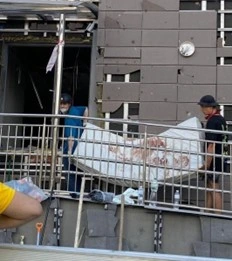
Cr: Illia Rachok Personal Documentary.
On the other hand, in Odessa, half of the population is Russian, including Maksym’s father. As a half-Russian, he seems to be in search of light. “I don’t know, some people in my hometown who are also half-Russian think this way; They are Russian, and so am I, how could I hurt my own people as well?” was his answer to the question if he would join the Ukrainian military service.
Days in the Tropical
Autumn then falls in September, such a comforting season, can be warm and rainy, and fills one heart’s content. For once in their life, it is summer in September. The warm sun shines throughout the daylight, the night breeze is comforting, and most importantly, the war is not in sight. The only thing they had to deal with was the constant hot weather, the rest is nothing hard to cope with, according to Maks. However, “You guys never walk, even 700m distances, you rather go with motors,” he explains further. Illia is no different, “I see left and right, all motorcycles, I rarely spot people walking, it’s only motors and pollution around,” he said in a playful tone.
Baca Juga: The Importance of Education for The Future
Food is not a challenge either, “I know there would be a lot of differences in terms of food between Eastern Europeans and Asians, but surprisingly enough I like Asians better.” Max explains, eyes brimming.

Cr: Mutiara Anindya.
Illia on the other hand, has another thought. “I first find the joy of eating rice here, the one my mom cooked was not very enjoyable, but eating vegetables is not really a thing here, almost every food is fried and oily, but it is fine,” he explains. Upon his arrival, he’s itching to find salad, but he finds nothing around. Annoyance fills him, he then goes to a nearby food stall and asks if they can lend him their kitchen to make the salad, good thing they let him. It is a simple cucumber and tomato salad covered with olive oils, and seasoned with salt and black pepper. The food stall later became his favorite place to dine.
Indonesia is not a big challenge for them, it is another new perspective and experience, however, as a devoted Orthodox Christian, Max finds another joy of living in Indonesia, one that makes him feel at home. It is an Orthodox church in Bekasi that shares a lot of resemblance with one he goes in Ukraine.
Friendship can also easily be built in Indonesia, according to them. “In Ukraine, I think it’s more performative, in Indonesia, you can simply hang out together over football or dinner and it stays for a long term. In Ukraine, it is mostly less casual, like a charity ball or formal events.” Illia explains.

Cr: Serafin Jovan, Google Image.
However, in terms of academics, Illia finds Indonesians to be very old-fashioned, and discussions between lecturer-students are very rare, “We are just listening to them talking on topics that we can study ourselves, it is boring, they talk, we listen, they told, we do. No compromise.” Illia said. “But it’s cool that the lecturer here tells us in advance, like at the very beginning of the semester of what we are going to do for our final, in Ukraine we don’t do so, we memorize the book, face the lecturer, and told them what we get.”
Baca Juga: The Dangers of Drugs for Youthers
Counting Days
Before they know it, their exchange study period is approaching to end. With the ongoing war, it is mandatory for them to leave within 2 weeks after their exchange study period ends. Maks is very much enjoying his time in Indonesia, doing a lot of things he can’t do in his home country, including having amazing companions, “I want to stay here for the rest of my life,” He said with a grimace, however, “It is either you leave for good and lose your citizenship or stay for good,” Illia explains, big on patriotism.
Illia did have a good time of youth in Indonesia to reminisce, however, Ukraine is home. His family are waiting for him to return and he can’t wait to return. A lot of Slavic youth don’t see a future in their home countries and hence they left. Illia, however, thinks that “Only stupid people can’t find a job, I’d be fine wherever I am but home will be best.
Penulis: Mutiara Anindya Abidin (009202300038)
Mahasiswa Ilmu Komunikasi President University
Editor: Ika Ayuni Lestari
Senior Editor: Rahmat Al Kafi
Ikuti berita terbaru di Google News




